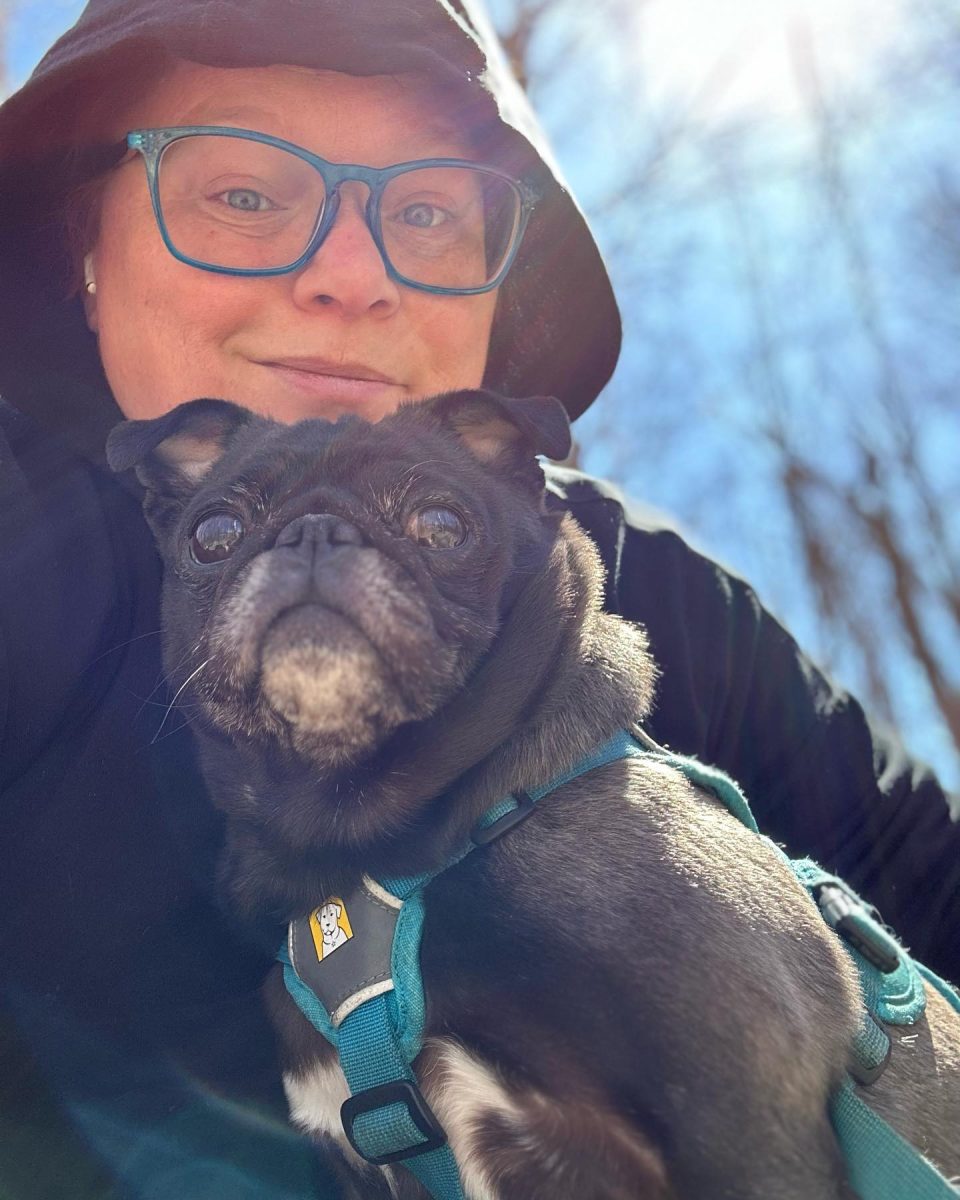Rick Cabot is a third-generation sock maker. Cabot, the owner of Darn Tough Vermont, visited JSC on Thursday, March 15, to speak about the brand which saved his family’s mill in Northfield, Vermont. About 70 people were seated in the auditorium in Bentley for the talk.
Cabot began by describing the early days at his family’s mill, which opened in 1978 in Northfield, Vt. The mill quickly grew its client roster and with it their business.
He said the ‘90s were the halcyon days for Cabot Hosiery Mills, with sales approaching $20 million. The company manufactured socks exclusively for other brands, and it counted Gap, L.L. Bean, Banana Republic, and Brooks Brothers among its clients. To handle the production demands, Cabot’s company contracted with other U.S. mills. “We had five mills in the Carolinas producing socks for us,” said Cabot.
The company then experienced a rapid drop in revenue in the early 2000s, the result of its competitors siphoning off business by outsourcing overseas. Cabot, who learned the business from the ground up working on the floor, found himself in a position that had forced many other U.S. manufacturers to close their mills and sell off assets.
His mill, thrust into a global marketplace, simply could not compete with foreign manufacturers who weren’t encumbered by U.S. laws that protect workers’ rights, employee safety, 40-hour work weeks, rights to collective bargaining, the environment, and forbid child labor. “The only reason we lost our base of business,” said Cabot, “is because somebody 3000 miles away could do it for a fraction of the price.”
Staring into a future with grim prospects, when most U.S. knitting mills would either go under or ship their manufacturing overseas, Cabot stood at a crossroads. Sales within a few years had dropped from nearly $20 million down to around $6 million. Cabot Hosiery Mills stood on the brink of bankruptcy.
What Cabot did next has been noticed and applauded all across the U.S. manufacturing world. His family doubled down. They secured money through the bank to launch their own brand, a move that must have seemed like business suicide.
The success of his plan hinged on creating an as yet nonexistent niche market. Cabot and his company would make high-performance socks of superior quality. Darn Tough Vermont was launched. Cabot highlighted the risk his family took by saying, “The world does not need another sock… The world doesn’t need another anything.” So how could he succeed in convincing consumers to spend more money for Darn Tough’s product? Cabot pointed to his socks.
The newly launched brand began by marketing its new socks to outdoor athletes. The advertisements pointed out the three main selling points: comfort, fit and durability, a slogan the brand still uses today. In addition to the simple sales pitch, Darn Tough offered an unconditional lifetime guarantee. “People aren’t as price sensitive as you would think,” said Cabot, “They just don’t want to be screwed.”
Cabot said that for most of the brand’s run the average percentage of sales lost to honoring the guarantee had been around .001 percent. The figure rose to .002 percent very recently. When Cabot, in business-like earnestness, told the crowd at JSC that he’s been trying to figure out where the .001 percent went, it solicited knowing laughter from the business-minded crowd.
The initial offering was a sock without frills. To borrow a phrase from Henry Ford, they were available in any color the customer wanted as long as the customer wanted black. Cabot said this choice proved integral to his business plan. He wanted to grab the outdoor athlete market, and knowing that outdoor athletes could not be swayed by frills, his mill would focus solely on quality. “Nobody ever outsourced anything for quality,” said Cabot.
The gambit worked. With the company’s commitment to quality, sales climbed, and then soared. The brand locked up legions of loyal customers over a number of years before it dared to broaden its product line. Darn Tough Vermont now offers socks with a variety of patterns, colors, and styles, marketed to both men and women.
In addition, the socks are made entirely in the United States with materials made entirely in the United States, a fact that secured for Darn Tough a lucrative military contract providing the highest quality socks for U.S. soldiers.
“One of the keys to the success of Darn Tough,” said Cabot, “is the strength of manufacturing. I’m on the factory floor most of the time. When I’m in the mill I have a ruler in my back pocket…any chance I get I’m measuring socks.”
Throughout the talk, Cabot constantly referred to his employees as the true reason for his company’s success as well as the reason his family didn’t consider closing operations when times got tough. In citing what his company now has that his competitors don’t, Cabot said it’s the know-how. The materials his brand uses are readily available and his competitors can easily acquire the same machines that knit his socks. Cabot says his company’s monopoly on the know-how could only have been cultured in a company that keeps its employees year in and year out. “Only Cabot Hosiery Mills could produce this sock,” said Cabot, “Nobody else could do it. Nobody else has our experience.”
Cabot said his employees make it to work the day after hurricanes and in the middle of snow storms. He attributed this loyalty and commitment by his employees to his family’s loyalty and commitment to them. Many of his workers taught him when he was on the floor, and they were there when Cabot and his family re-invested in the mill when they launched Darn Tough Vermont.
Last year Darn Tough Vermont purchased 30 new knitting machines, according to Cabot, the only U.S. manufacturer to do so.






